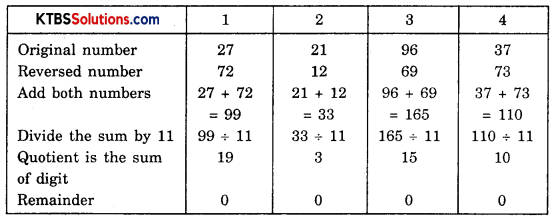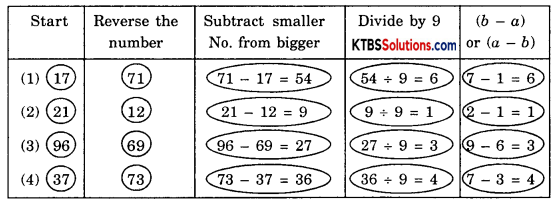You can Download KSEEB Solutions for Class 8 Maths Chapter 16 Playing with Numbers InText Questions and Answers helps you to revise the complete syllabus.
KSEEB Solutions for Class 8 Maths Chapter 16 Playing with Numbers InText Questions
Try These (Page 250)
Question 1.
Write the following numbers in generalized form.
(i) 25
(ii) 73
(iii) 129
(iv) 302
Solution:
(i) 25 = 20 + 5 = 10 × 2 + 5 × 1
(ii) 73 = 70 + 3 = 10 × 7 + 3 × 1
(iii) 129 = 100 + 20 + 9 = 100 × 1 + 2 × 10 + 9 × 1
(iv) 302 = 300 + 00 + 2 = 100 × 3 + 10 × 0 + 2 × 1
![]()
Question 2.
Write the following in the usual forms:
(i) 10 × 5 + 6
(ii) 100 × 7 + 10 × 1 + 8
(iii) 100 × a + 10 × c + b
Solution:
(i) 10 × 5 + 6 = 50 + 6 = 56
(ii) 100 × 7 + 10 × 1 + 8 = 700 + 10 + 8 = 718
(iii) 100 × a + 10 × c + b = 100a + 10c + b
Try These (Page 251)
Question 1.
Check what the result would have been if Sundaram had chosen the numbers shown below:
1. 27
2. 21
3. 96
4. 37
Solution:

Try These (Page 251)
Question 1.
Check what the result would have been if Sundaram had chosen the numbers shown below:
1. 17
2. 21
3. 96
4. 37
Solution:

![]()
Try These (Page 252)
Question 1.
Check what the result would have been ifMinakshi had chosen the numbers shown below. In each case keep a record of the quotient obtained at the end.
1. 132
2. 469
3. 737
4. 901
Solution:
1. Let the Minakshi had chosen the 3-digit number 132.
Reversed number = 231
Difference = 231 – 132 = 99
Division by 99 = 99 ÷ 99 = 1 with no remainder
Hence, Quotient = 1, Remainder = 0
2. Number = 469
Reversed number = 964
Difference = 964 – 469 = 495
Division by 99 = 495 ÷ 99 = 5
Quotient = 5, Remainder = 0
3. Original number = 737
Reversed number = 737
Difference = 737 – 737 = 0
Division by 99 = 0 ÷ 99 = 0
Quotient = 0, Remainder = 0
![]()
4. Original number = 901
Reversed number = 109
Difference = 901 – 109 = 792
Division by 99 = 792 ÷ 109 = 8
Hence quotient = 8, Remainder = 0
Conclusion: Hence, the resulting number is divisible by 99 in each case and the quotient obtained is (c – a) or (a – c).
So, the remainder is zero.
Try These (Page 253)
Question 1.
Check what the result would have been if Sundaram had chosen the numbers shown below:
1. 417
2. 632
3. 117
4. 937
Solution:
1. Original number = 417 [It is of the form abc]
Changing digit like (cab) = 741
Changing digit like (bca) = 174
Add numbers = 417 + 741 + 174 = 1332
Divide the resulting number 1332 by 37.
∴ 1332 ÷ 37 = 36 (No remainder)
Hence, the number is divisible by 37 and the remainder 0.
2. abc = 632 [a = 6, b = 3, c = 2]
cab = 263
bca = 326
Add = 632 + 263 + 326 = 1221
Divide the number by 37
1221 ÷ 37 = 33 (No remainder)
∴ The number so obtained is divisible by 37.
![]()
3. abc = 117 [a = 1, b = 1 and c = 7]
cab = 711
bca = 171
Add = 117 + 711 + 171 = 999
Divide the number by 37
999 ÷ 37 = 27 (No remainder)
∴ The resulting number is divisible by 37.
4. abc = 937
cab = 793 [a = 9, b = 3, c = 7]
bca = 379
Add the number = 937 + 793 + 379 = 2109
Divide the number by 37
2109 ÷ 37 = 57 (No remainder)
The resulting number is divisible by 37.
Try These (Page 257)
Question 1.
If the division N ÷ 5 leaves a remainder of 3, what might be the digit of N? (The one’s digit, when divided by 5, must leave a remainder of 3. So the one’s digit must be either 3 or 8.)
Solution:
The one’s digit, when divided by 5, must leave a remainder of 3. So the one digit must be either 3 or 8.
Question 2.
If the division N ÷ 5 leaves a remainder of 1, what might be the one’s digit of N?
Solution:
The ones digit when divided by 5 leaves a remainder 1.
∴ One’s digit must be either 1 or 6.
![]()
Question 3.
If the division N ÷ 5 leaves a remainder of 4, what might be the one’s digit of N?
Solution:
The one’s digit must be either 4 or 9.
Try These (Page 257)
Question 1.
If the division N ÷ 2 leaves a remainder of 1, what might be the one’s digit of N? (N is odd; so its one’s digit is odd. Therefore, the one’s digit must be 1, 3, 5, 7 or 9.)
Solution:
N is odd, so it’s one digit is odd.
∴ One’s digit must be 1, 3, 5, 7, or 9.
Question 2.
If the division N ÷ 2 leaves no remainder (i.e., zero remainders), what might be the one’s digit of N?
Solution:
The one digit of N must be 0, 2, 4, 6, or 8.
![]()
Question 3.
Suppose that the division N ÷ 5 leaves a remainder of 4, and the division N ÷ 2 leaves a remainder of 1. What must be the one’s digit of N?
Solution:
N ÷ 5 leaves a remainder of 4.
∴ One’s digit of N should be 4 or 9.
Now N ÷ 2 leaves a remainder of 1.
∴ One’s digit of N should be 1, 3, 5, 7, 9.
9 is a common digit in both cases.
∴ One’s digit of N must be 9.
Try These (Page 259)
Question 1.
Check the divisibility of the following by number 9.
1. 108
2. 616
3. 294
4. 432
5. 927
Solution:
1. Sum of digits of 108 is 1 + 0 + 8 = 9
So, the number is divisible by 9.
Because sum of the digits is divisible by 9.
2. Sum of digits of 616 is 6 + 1 + 6 = 13
13, is not divisible by 9
∴ 616 is not divisible by 9.
3. Sum of digits of 294 is 2 + 9 + 4 = 15
15, is not divisible by 9
∴ 294, is not divisible by 9.
![]()
4. Sum of digits of 432 is 4 + 3 + 2 = 9
9, is divisible by 9.
∴ 432 is divisible by 9
5. Sum of digits of 927 is 9 + 2 + 7 = 18
18, is divisible by 9
∴ 927 is divisible by 9.
Try These (Page 260)
Question 1.
Check the divisibility of the following numbers by 3.
1. 108
2. 616
3. 294
4. 432
5. 927
Solution:
1. The sum of digits of 108 = 1 + 0 + 8 = 9
9 is divisible by 3
∴ 108 is divisible by 3.
2. The sum of the digits of 616 = 6 + 1 + 6 = 13
13 is not divisble by 3
∴ 616 is not divisible by 3.
3. The sum of the digits of 294 = 2 + 9 + 4 = 15
15 is divisible by 3
∴ 294 is divisible by 3.
![]()
4. The sum of the digits 432 = 4 + 3 + 2 = 9
9 is divisible by 3
∴ 432 is divisible by 3.
5. The sum of the digits 927 = 9 + 2 + 7 = 18
18 is divisible by 3
∴ 927 is divisible by 3.